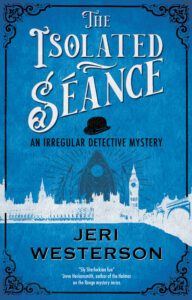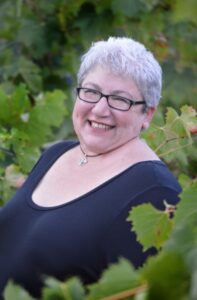Launch: Jeri Westerson’s The Isolated Seance
INTERVIEW BY ANNE EASTER SMITH
Los Angeles native Jeri Westerson is the author of fifteen Crispin Guest Medieval Noir Mysteries, a series nominated for thirteen awards from the Agatha to the Shamus. She is currently writing a Tudor series called the King’s Fool Mysteries and a Sherlockian series called The Irregular Detective Mysteries. She has also authored several paranormal series and standalone historical novels. She has served as president of the SoCal Chapter of Mystery Writers of America, president and vice president for two local chapters of Sisters in Crime, and is a founding member of the SoCal chapter of the Historical Novel Society.
In a couple of sentences, give us a flavor of The Isolated Seance, your first book in a series set in late Victorian London.
A former Baker Street Irregular, along with his friend and colleague, open their own detective agency. But working in the shadow of Sherlock Holmes, they find they are out-flanked and just a step behind … until they find a case Holmes won’t take.
 What drew you to write a spin-off of the Sherlock Holmes phenomenon? It does seem to be trending these days with books, such as Enola Holmes, Mrs. Holmes, Daughter of Sherlock, A Study in Scarle, Holmes on the Range, and even Kareem Abdul-Jabbar gets into it with Mycroft.
What drew you to write a spin-off of the Sherlock Holmes phenomenon? It does seem to be trending these days with books, such as Enola Holmes, Mrs. Holmes, Daughter of Sherlock, A Study in Scarle, Holmes on the Range, and even Kareem Abdul-Jabbar gets into it with Mycroft.
I had done some heavy research into the late Victorian period for my gaslamp-steampunk fantasy trilogy The Enchanter Chronicles, and it got me to thinking how much I enjoyed doing that research and the time period itself, so I began to consider another Victorian series. What would be better than a Sherlockian pastiche? But I didn’t want to muck about with the canon, and so I decided on something Sherlock adjacent: his Baker Street Irregulars. Such characters could stumble about a bit trying to keep to the method while they attempt to solve cases to the best of their abilities within the framework of their class, their education, and natural intelligence.
Why do you think anything “Sherlock” still resonates today? The writing? The characters? The stories?
They aren’t particularly “play fair” mysteries, so it’s Holmes himself that is the draw. Holmes is particularly single-minded in his pursuit of justice. He doesn’t have any love interest entanglements. We understand this person. We recognize him from a Victorian perspective, as well as from the modern, as someone on the spectrum who can cut through all distractions to get to the heart of what is actually happening in the story.
Where did you draw your two protagonists from? (Badger, as one of Holmes’ Baker Street Irregulars was a no-brainer, but choosing a Black Watson, who would have been so conspicuous in late 19th century England, was inspired. I loved him! But where was he drawn from?)
I don’t think he would have been conspicuous at all. There were black people in England since the Tudor period. And though they didn’t have the baggage of a person of color in the United States, having arrived as enslaved people, they weren’t exactly welcome in England, which appreciated a white, homogenous society. The Doyle Holmes series seemed to lack that diversity and I wanted to put it back in. And I wanted Badger to have a “Watson” to help him. The truth of it is, Ben Watson is the smarter of the two, having been a chemist’s assistant and absorbing all the information about medicines and the human body, but also having more esoteric experience as a fun fair performer, a chimney sweep, and a blacksmith, among his many varied professions. Watson is the mature one, versus Badger’s eagerness and youthful hubris. But together, they balance each other out to make a good team.
You are an incredibly prolific mystery writer—putting out two and sometimes three books a year. You have several series in different periods and genres going at once. You must have an intricate organizational process to be able to jump back and forth from Tudor, to medieval, to steampunk fantasy, and even to a gay series, and keep everything straight? Tell us about it.
I think you might be picturing someone doing a juggling act, but the reality is that I had been writing my medieval series for some fifteen years and, in between contracts for the rest of that series, I managed to sneak in some paranormal series and my LGBTQ Skyler Foxe Mysteries. Once one book was done in one series, I could pick up the next book in the other. Now I can concentrate on my King’s Fool Mysteries, and write the next in the Irregular Detective series, one at a time, never together. I’m a mimic. With the Tudor series I sort of get into a Shakespearean cadence, which is in first person, and when I finish one of those and go into the Victorian, I pick up my penny dreadful/ Doyle rhythm.
Which genre or period is your favorite? Do you yourself identify with one more than another?
I think I am currently most identified as a medieval mystery writer, and, technically, the Tudor period with Henry VIII is medieval but on the cusp of Renaissance. But throw in Victorian and it’s probably best to identify me as a “historical mystery writer.”
 Your London vernacular of the 19th century was impressive and believable to my Londoner ears. Do you have resources to share for it?
Your London vernacular of the 19th century was impressive and believable to my Londoner ears. Do you have resources to share for it?
I’m a rabid Anglophile and consume both books, films, and television from the UK. I can hear the regional dialects in my head. But I am sure to check things, particularly idioms through the Oxford English Dictionary and other sources. And my publisher is UK-based.
It seems you follow trends in your writing: having a Black experience, or a gay protagonist, or fantasy settings and paranormal themes. Are you the trendsetter or is it just luck? (I notice there are no books set in WWII, for example!)
And there won’t be any in the modern period. Not like that, anyway. I prefer history with my mystery. You can’t really follow trends because they are gone before you could complete your novel and get it to a publisher. I write what I want to read. So maybe I am a trendsetter.
What is the last great historical novel you read that you can recommend?
The Starless Sea by Erin Morgenstern, but I don’t really think it’s historical, yet it has that feel to it, with prose that is reminiscent of an earlier time, so I guess I’ll stick with that answer.
![]()






